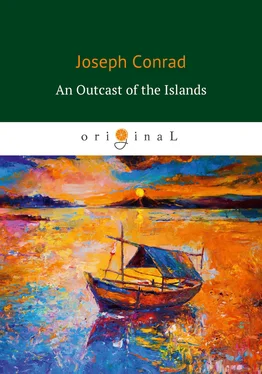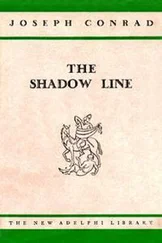He hurried on, driven by a suddenly awakened curiosity, and entered the narrow way between the bushes. At the next turn of the path he caught again the glimpse of coloured stuff and of a woman’s black hair before him. He hastened his pace and came in full view of the object of his pursuit. The woman, who was carrying two bamboo vessels full of water, heard his footsteps, stopped, and putting the bamboos down half turned to look back. Willems also stood still for a minute, then walked steadily on with a firm tread, while the woman moved aside to let him pass. He kept his eyes fixed straight before him, yet almost unconsciously he took in every detail of the tall and graceful figure. As he approached her the woman tossed her head slightly back, and with a free gesture of her strong, round arm, caught up the mass of loose black hair and brought it over her shoulder and across the lower part of her face. The next moment he was passing her close, walking rigidly, like a man in a trance. He heard her rapid breathing and he felt the touch of a look darted at him from half-open eyes. It touched his brain and his heart together. It seemed to him to be something loud and stirring like a shout, silent and penetrating like an inspiration. The momentum of his motion carried him past her, but an invisible force made up of surprise and curiosity and desire spun him round as soon as he had passed.
She had taken up her burden already, with the intention of pursuing her path. His sudden movement arrested her at the first step, and again she stood straight, slim, expectant, with a readiness to dart away suggested in the light immobility of her pose. High above, the branches of the trees met in a transparent shimmer of waving green mist, through which the rain of yellow rays descended upon her head, streamed in glints down her black tresses, shone with the changing glow of liquid metal on her face, and lost itself in vanishing sparks in the sombre depths of her eyes that, wide open now, with enlarged pupils, looked steadily at the man in her path. And Willems stared at her, charmed with a charm that carries with it a sense of irreparable loss, tingling with that feeling which begins like a caress and ends in a blow, in that sudden hurt of a new emotion making its way into a human heart, with the brusque stirring of sleeping sensations awakening suddenly to the rush of new hopes, new fears, new desires – and to the flight of one’s old self.
She moved a step forward and again halted. A breath of wind that came through the trees, but in Willems’ fancy seemed to be driven by her moving figure, rippled in a hot wave round his body and scorched his face in a burning touch. He drew it in with a long breath, the last long breath of a soldier before the rush of battle, of a lover before he takes in his arms the adored woman; the breath that gives courage to confront the menace of death or the storm of passion.
Who was she? Where did she come from? Wonderingly he took his eyes off her face to look round at the serried trees of the forest that stood big and still and straight, as if watching him and her breathlessly. He had been baffled, repelled, almost frightened by the intensity of that tropical life which wants the sunshine but works in gloom; which seems to be all grace of colour and form, all brilliance, all smiles, but is only the blossoming of the dead; whose mystery holds the promise of joy and beauty, yet contains nothing but poison and decay. He had been frightened by the vague perception of danger before, but now, as he looked at that life again, his eyes seemed able to pierce the fantastic veil of creepers and leaves, to look past the solid trunks, to see through the forbidding gloom – and the mystery was disclosed – enchanting, subduing, beautiful. He looked at the woman. Through the checkered light between them she appeared to him with the impalpable distinctness of a dream. The very spirit of that land of mysterious forests, standing before him like an apparition behind a transparent veil – a veil woven of sunbeams and shadows.
She had approached him still nearer. He felt a strange impatience within him at her advance. Confused thoughts rushed through his head, disordered, shapeless, stunning. Then he heard his own voice asking —
“Who are you?”
“I am the daughter of the blind Omar,” she answered, in a low but steady tone. “And you,” she went on, a little louder, “you are the white trader – the great man of this place.”
“Yes,” said Willems, holding her eyes with his in a sense of extreme effort, “Yes, I am white.” Then he added, feeling as if he spoke about some other man, “But I am the outcast of my people.”
She listened to him gravely. Through the mesh of scattered hair her face looked like the face of a golden statue with living eyes. The heavy eyelids dropped slightly, and from between the long eyelashes she sent out a sidelong look: hard, keen, and narrow, like the gleam of sharp steel. Her lips were firm and composed in a graceful curve, but the distended nostrils, the upward poise of the half-averted head, gave to her whole person the expression of a wild and resentful defiance.
A shadow passed over Willems’ face. He put his hand over his lips as if to keep back the words that wanted to come out in a surge of impulsive necessity, the outcome of dominant thought that rushes from the heart to the brain and must be spoken in the face of doubt, of danger, of fear, of destruction itself.
“You are beautiful,” he whispered.
She looked at him again with a glance that running in one quick flash of her eyes over his sunburnt features, his broad shoulders, his straight, tall, motionless figure, rested at last on the ground at his feet. Then she smiled. In the sombre beauty of her face that smile was like the first ray of light on a stormy daybreak that darts evanescent and pale through the gloomy clouds: the forerunner of sunrise and of thunder.
There are in our lives short periods which hold no place in memory but only as the recollection of a feeling. There is no remembrance of gesture, of action, of any outward manifestation of life; those are lost in the unearthly brilliance or in the unearthly gloom of such moments. We are absorbed in the contemplation of that something, within our bodies, which rejoices or suffers while the body goes on breathing, instinctively runs away or, not less instinctively, fights – perhaps dies. But death in such a moment is the privilege of the fortunate, it is a high and rare favour, a supreme grace.
Willems never remembered how and when he parted from Aissa. He caught himself drinking the muddy water out of the hollow of his hand, while his canoe was drifting in mid-stream past the last houses of Sambir. With his returning wits came the fear of something unknown that had taken possession of his heart, of something inarticulate and masterful which could not speak and would be obeyed. His first impulse was that of revolt. He would never go back there. Never! He looked round slowly at the brilliance of things in the deadly sunshine and took up his paddle! How changed everything seemed! The river was broader, the sky was higher. How fast the canoe flew under the strokes of his paddle! Since when had he acquired the strength of two men or more? He looked up and down the reach at the forests of the bank with a confused notion that with one sweep of his hand he could tumble all these trees into the stream. His face felt burning. He drank again, and shuddered with a depraved sense of pleasure at the after-taste of slime in the water.
It was late when he reached Almayer’s house, but he crossed the dark and uneven courtyard, walking lightly in the radiance of some light of his own, invisible to other eyes. His host’s sulky greeting jarred him like a sudden fall down a great height. He took his place at the table opposite Almayer and tried to speak cheerfully to his gloomy companion, but when the meal was ended and they sat smoking in silence he felt an abrupt discouragement, a lassitude in all his limbs, a sense of immense sadness as after some great and irreparable loss. The darkness of the night entered his heart, bringing with it doubt and hesitation and dull anger with himself and all the world. He had an impulse to shout horrible curses, to quarrel with Almayer, to do something violent. Quite without any immediate provocation he thought he would like to assault the wretched, sulky beast. He glanced at him ferociously from under his eyebrows. The unconscious Almayer smoked thoughtfully, planning to-morrow’s work probably. The man’s composure seemed to Willems an unpardonable insult. Why didn’t that idiot talk to-night when he wanted him to?… on other nights he was ready enough to chatter. And such dull nonsense too! And Willems, trying hard to repress his own senseless rage, looked fixedly through the thick tobacco-smoke at the stained tablecloth.
Читать дальше











